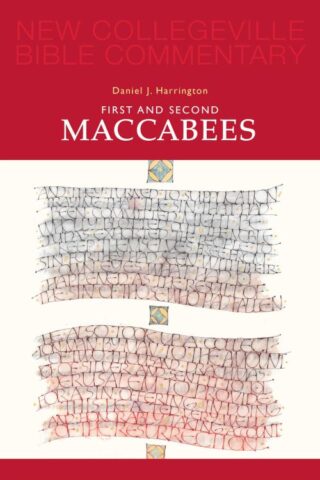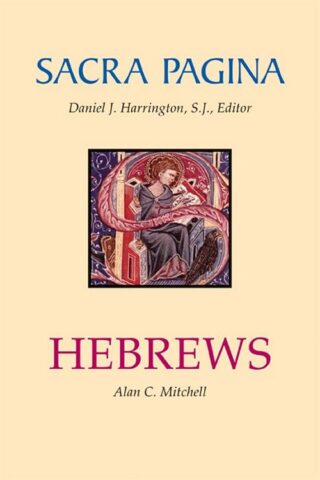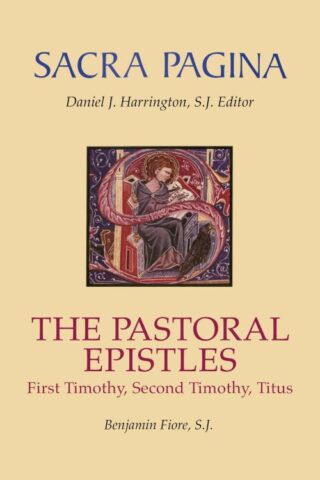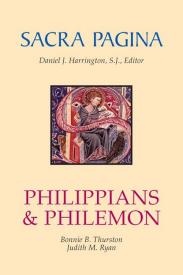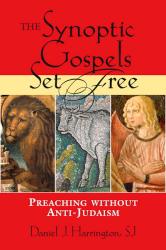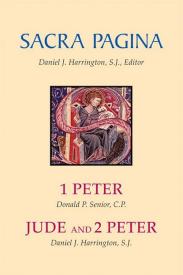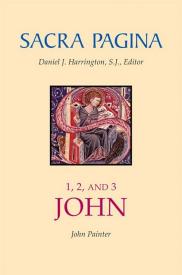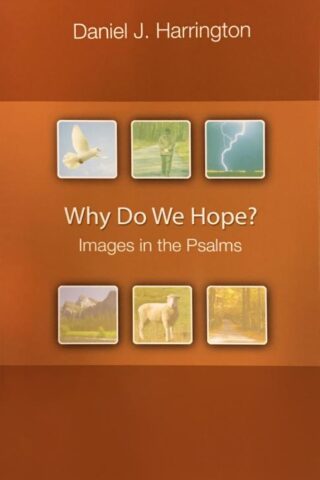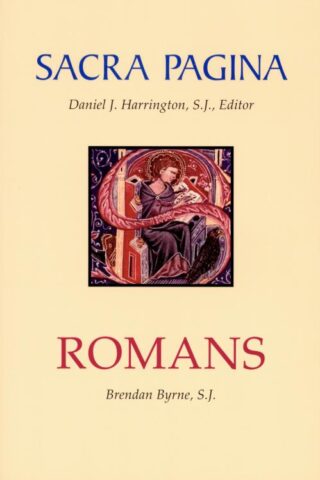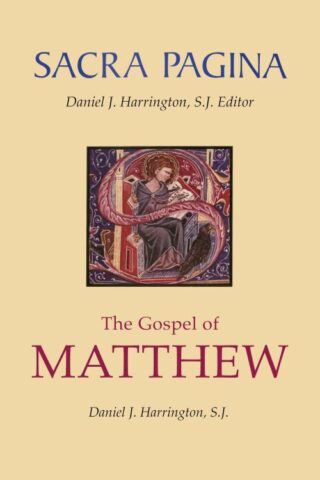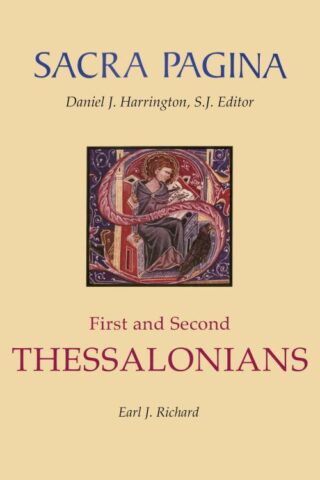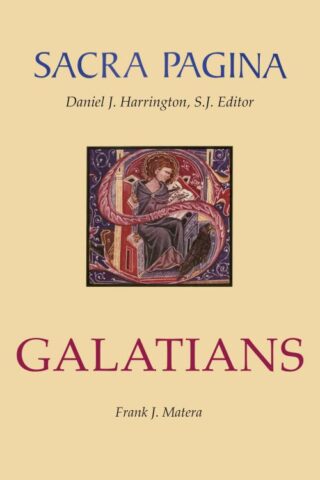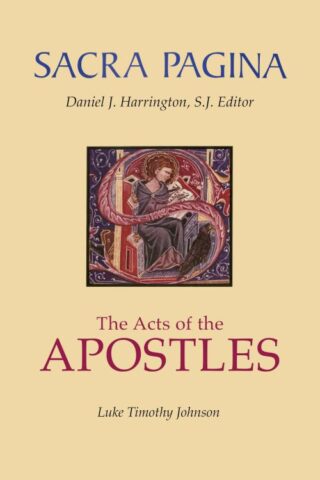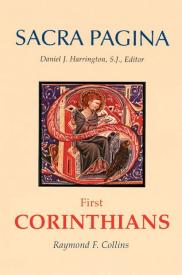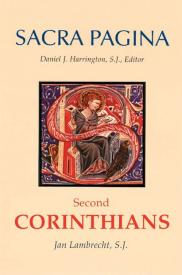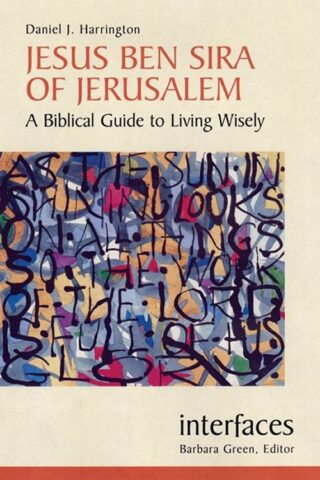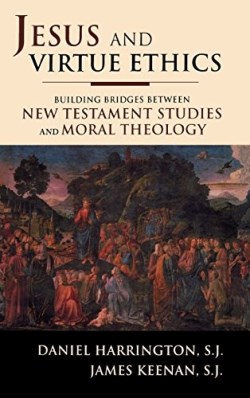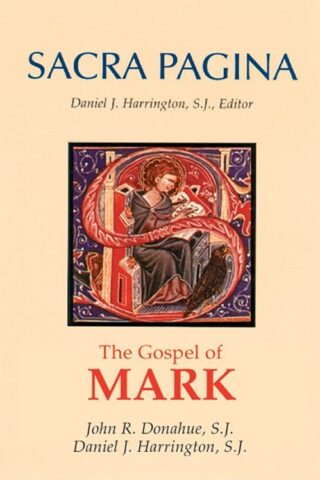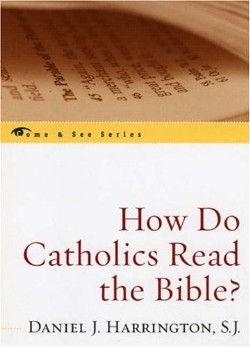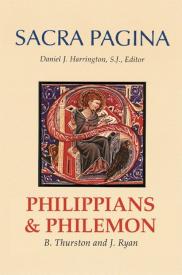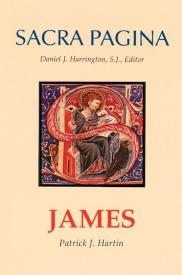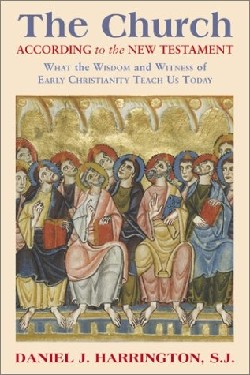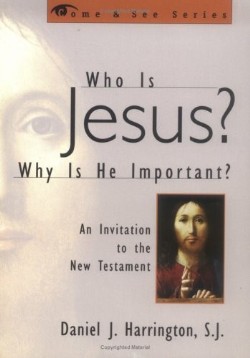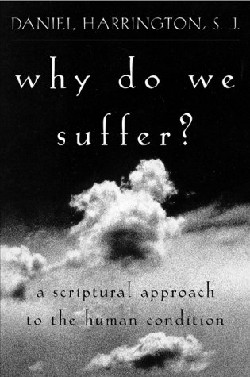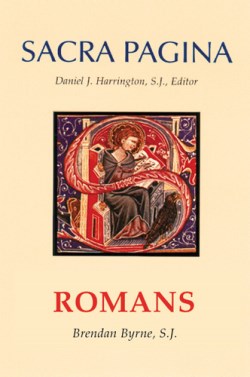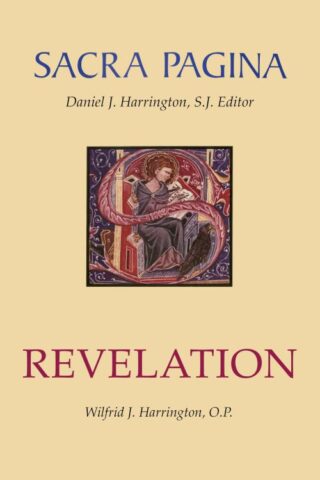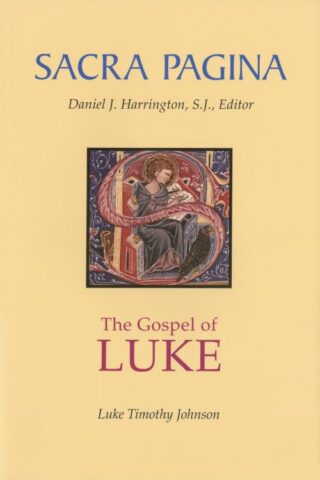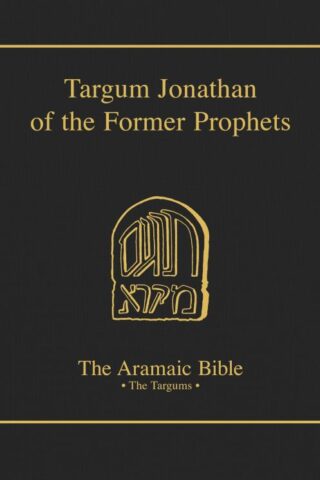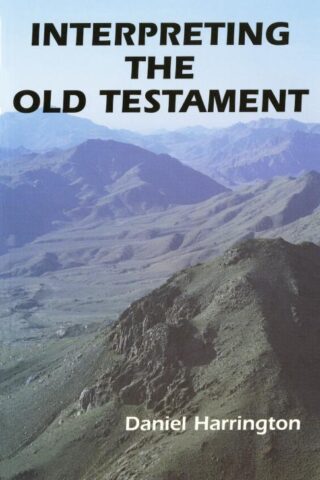Daniel Harrington
Showing all 31 resultsSorted by latest
-
1-2 Maccabees
$16.95Add to cartOften neglected, the books of the First and Second Maccabees are important for Christians, as in them is told how the Jewish people established the political and religious culture into which Jesus was born. The martyr stories inform the early Christian martyrdoms, and the books are written in Greek, the language in which the Jews of Jesus’ time read the scriptures. More importantly, as Father Harrington notes, without the Maccabees, “the fate of Judaism (and with it Christianity and Islam) was uncertain.”
-
Hebrews
$44.95Add to cartScarcely any book of the New Testament (with the possible exception of Revelation) is so perplexing as the “Letter to the Hebrews.” Not really a letter, but a sermon with some features of a letter added to it, not really by its putative author, Paul, but by an anonymous Christian who wrote some of the most elegant Greek in the Bible, not really addressed to the “Hebrews,” but to Christians, probably in Rome-this is the work that Alan Mitchell explains in this commentary.
Many scholars have written fine commentaries on Hebrews, and Mitchell stands on their shoulders, noting where he proposes alternate interpretations. Mitchell pays particular attention to the reliance of the author of Hebrews on the Greek Old Testament (the Septuagint). He also compares the language of Hebrews with similar usage and ideas of first-century Hellenistic Jewish authors, notably Flavius Josephus and Philo of Alexandria. Furthermore, he situates Hebrews against the background of the tradition of Hellenistic Moral Philosophy, where that is appropriate. Mitchell thus locates Hebrews in its proper thought-world, something that is essential for the modern reader in dealing with some of the thornier questions raised by this biblical book. Chief among these are the role of sacrificial atonement, the question of “second repentance,” and the spiritual and moral formation of the Roman Christians who were its recipients.
Like all the volumes in the Sacra Pagina series, this work examines the text in detail, with careful attention to the words and phrasing, and then brings those individual insights together into a coherent summary. The bibliography and special lists appended to each chapter cover the best of recent scholarship on the Letter to the Hebrews.
-
Pastorial Epistles : First Timothy Second Timothy And Titus
$29.95Add to cartFirst and Second Timothy and Titus have for many years borne the collective title “The Pastoral Epistles.” Both their style and their content make it difficult to locate them within the corpus of Pauline letters, and recent scholarship most often considers them pseudonymous, works that imitate Paul’s letters but apply the apostle’s teaching to the concerns of a later time, two or more decades after Paul’s death.
The Pastorals differ from Paul’s own letters in being addressed to single individuals, coworkers of Paul who have been placed in charge of particular churches-Timothy apparently in Ephesus, Titus in Crete. They provide instruction for community leaders, both the individual addressees and other leaders whom they will appoint. The specification of certain offices within the local churches is one of the features that appear to locate these works in a later phase of church development.
In this commentary Benjamin Fiore, SJ, places the Pastorals in their historical and literary context. The reader will find here a solid introduction to parallel literary forms in Latin and Greek literature and particular descriptions of the way in which these documents use ancient rhetorical forms to achieve their paraenetic and hortatory purpose. Drawing on his parish experience as well as his academic training, Fiore also provides reflections on the contemporary pastoral application of these books, giving readers a renewed appreciation for the “pastoral” label these epistles bear.
-
Philippians And Philemon
$39.95Add to cartPhilippians is one of the most interesting and beloved of Paul’s undisputed epistles. In Philippians and Philemon, Bonnie Thurston makes a convincing case that canonical Philippians is as Paul wrote it, one letter. A translation conforming as closely as possible to the original Greek is provided, along with a careful analysis of the language of the letter that yields insights into the context and theological underpinning of this epistle.
The apostle’s very brief letter to Philemon stands solidly within the Pauline collection of authentic and canonical letters. In this commentary Judith Ryan shows how Paul combined his theology with contemporary rhetorical strategies to produce an effective challenge to his audience. -
James
$39.95Add to cartIn his commentary on the letter of James, Hartin offers a unique approach toward understanding a much-neglected writing. Refusing to read the letter of James through the lens of Paul, Hartin approaches the letter in its own right. Using recent studies on rhetorical culture, Hartin illustrates how James takes Jesus’ sayings and performs them again in his own way to speak to the hearers/readers of his own world. Readers will discover new and refreshing insights into the world of early Christianity as well as a teaching that is of perennial significance.
-
1 Peter Jude And 2nd Peter
$39.95Add to cartCrisis in the church is not a new phenomenon. In fact, the church has always been-and probably always will be-involved in some kind of crisis. Even in the apostolic period, which is regarded by many as the church’s golden age, there were serious crises coming both from the outside, as in 1 Peter, and from the inside, as in Jude and 2 Peter. The three short New Testament letters treated in 1 Peter, Jude and 2 Peter illustrate the problems early Christians faced as well as the rhetorical techniques and theological concepts with which they combated those problems.
In the first part of this volume, Donald Senior views 1 Peter as written from Rome in Peter’s name to several churches in northern Asia Minor-present-day Turkey-in the latter part of the first century CE. The new Christians addressed in 1 Peter found themselves aliens and exiles in the wider Greco-Roman society and suffered a kind of social ostracism. But they are given a marvelous theological vision of who they have become through their baptism and pastoral encouragement to stand firm. They are shown how to take a missionary stance toward the outside world by giving the witness of a holy and blameless life to offset the slander and ignorance of the non-Christian majority and possibly even to lead them to glorify God on the day of judgment.
In the second part of this volume, Daniel Harrington interprets Jude and 2 Peter as confronting crises in the late first century that were perpetrated by Christian teachers who are described polemically as intruders in Jude and as false teachers in 2 Peter. In confronting the crises within their churches, the authors appeal frequently to the Old Testament and to early summaries of Christian faith. While Jude uses other Jewish traditions, 2 Peter includes most of the text of Jude as well as many distinctively Greek terms and concepts. It is clear that for the authors, despite their different social settings, what was at stake was the struggle for the faith.
-
1-3 John
$34.95Add to cartThe Johannine Epistles are today read as an important part of the Johannine literature. Yet the meaning of the text is often unclear. Part of the problem arises because, although 1 John is called an Epistle, it lacks the formal marks of an Epistle. In 1, 2, and 3 John, John Painter illuminates the relationship 1, 2, and 3 John have to each other and to the Gospel.
Painter explains the historical context of the Johannine Epistles using a socio-rhetorical approach. The writings are shown to reflect a situation of conflict and schism within the Johannine community; they seek to persuade the readers of the truth of the writer’s message. In this truth, the readers are encouraged to abide if they would have the assurance of eternal life.Painter also examines the inseparable connection between belief and ethical life in active love for one another. Through the socio-rhetorical approach Painter brings to light the continuing relevance of these writings.
-
Why Do We Hope
$19.95Add to cartIn this follow up to his popular book, What Are We Hoping For? New Testament Images, Daniel Harrington extends his reflections on hope in the Scriptures. He draws us into the striking images of the psalms – the mountain, the sun, refuge, the kingdom, sheltering wings, the olive tree, and the shepherd – to lead us to the discovery that hope is the predominant image of the book of Psalms.
Even in their darkest laments, the psalmists remind us that God hears us and will never abandon us. In these brief essays, Harrington opens up the language of forty psalms, explores their literary ahd historical context, and then ties the psalm to our reading as Christians whose ultimate hope is in Jesus Christ.
-
Romans
$49.95Add to cartWhile widely acknowledged as the single most influential document in Christian history, Paul’s Letter to the Romans has also attracted the most comment. Standing at the head of Paul’s writings in the New Testament and so eloquently delivering his Gospel, Romans has presented Paul to generations of readers: from Augustine in the fifth century, through the Reformation era, down to the present day.
This commentary adopts a literary-rhetorical approach, viewing the letter as an instrument of persuasion designed to transform readers through a celebratory presentation of the Gospel. Reflecting upon the fate of Jews and Gentiles, Paul wins his audience to a vision of a God who always acts inclusively. The God who, in the person of Israel’s Messiah (Jesus), has acted faithfully to include the Gentile peoples within the community of salvation, will not fail to see to the eventual inclusion of Israel as well. In the victory of grace displayed already in the risen humanity of Jesus, the original design of the Creator for human communities and for the world begins to come true.
The interpretation of Paul’s letter to Rome has accompanied and stimulated the path of Christian theology down to today. Romans touches upon virtually all main issues of Christian theology as well as presenting a rewarding introduction to Paul. Byrne facilitates full access to Paul and his Gospel through the letter, allowing Christians today to hear Paul’s voice as intelligibly and powerfully as it has spoken to past generations. Includes an updated bibliography and appendix.
-
Gospel Of Matthew
$44.95Add to cartMatthew wrote his Gospel from his perspective as a Jew. It is with sensitivity to this perspective that Father Harrington undertakes this commentary on the Gospel of Matthew.
After an introduction, he provides a literal translation of each section in Matthew’s Gospel and explains the textual problems, philological difficulties, and other matters in the notes. He then presents a literary analysis of each text (content, form, use of sources, structure), examines the text against its Jewish background, situates it in the context of Matthew’s debate with other first-century Jews, and reflects on its significance for Christian theology and Christian-Jewish relations. Includes an updated bibliography and appendix.
-
Jesus : A Historical Portrait
$18.99Add to cartQuestions about the life and times of Jesus Christ, one of the most written about people of all time, continue to intrigue us two millennia after his death. Between the vagueness of the canonical Gospels and the sensational claims made in modern films and books, what is a Christian to believe about the only Son of God?
Employing a popular take on current New Testament scholarship, Jesuit scholar Father Daniel Harrington explores difficult as well as less complicated issues surrounding the life of Christ.
-
1-2 Thessalonians
$29.95Add to cartThe letters First and Second Thessalonians are traditionally associated with the Pauline foundation of the Macedonian Church at Thessalonica. The first is seen as representing Paul’s earliest epistolary efforts and as providing two successive moments in his long relationship as advisor to that community. Soon after leaving the area for the southern province of Achaia, Paul addresses the concerns of the new Gentile converts and at a later period responds more directly to queries received from the thriving and successful community. The second document, written in Paul’s name and at a later date, attempts to calm the apocalyptic fervor of the community by reiterating its traditional eschatological and Christological teaching.
After treating these introductory matters, this study provides a new translation of each section of the canonical text, explains in notes the pertinent textual and linguistic features of the text, and then offers in a series of interpretive messages a literary, rhetorical, and thematic analysis of the biblical documents. The constant concern of this commentary is to provide assistance to modern readers in discerning the relationship between the authors and their intended readers. Short bibliographies suggest other important modern studies. Includes an updated bibliography as an appendix.
-
Galatians
$39.95Add to cartPaul’s Letter to the Galatians has played a major role in the history of theology, especially in the Church’s teaching on grace, faith, and justification. This commentary argues that Paul’s doctrine of justification by faith is essentially social in nature and has important ecumenical implications for the Church today. In its original setting, Galatians established a foundation for the unity of Jewish and Gentile Christians: all are justified by the faith of Jesus Christ.
In addition to illuminating the historical situation that led Paul to write his Letter to the Galatians, this commentary pays careful attention to the rhetorical structure of this letter and its theological message. The author provides a fresh translation of Galatians, critical notes on each verse of the text, and a careful commentary of the letter in light of Paul’s theology.
Theories abound on the question of Galatians, why it was written, what it says, and what the implications of that message are. Yet few scholars have devoted themselves at length to this letter. What sets this work apart is the extent and detail of its scholarship. Includes an updated bibliography as an appendix.
-
Acts Of The Apostles
$54.95Add to cartThe Acts of the Apostles is the second volume in the two-part writing scholars call Luke-Acts. It continues the story begun in the Gospel of Luke, showing how the Good News offered by Jesus was eventually extended “to the end of the earth,” so that Gentiles as well as Jews came to share in the blessings of God.
This commentary treats Luke-Acts as an apologetic history. It takes with equal seriousness Luke’s literary artistry and his historical interests, fitting his methods comfortably within the ancient standards of historiography. This perspective illustrates in particular that Luke’s historical narrative serves a definite religious intent. Tracing that intent through the specific contours of Luke’s story is the special contribution of this commentary.
-
1st Corinthians
$49.95Add to cartOne of the most exciting of Paul’s letters, First Corinthians offers a vantage point from which modern readers can reflect on the diversity in Christian Churches today. In First Corinthians, Raymond Collins explores that vantage point as well as the challenge Paul posed to the people of his time-and continues to pose in ours-to allow the gospel message to engage them in their daily lives.
Paul introduces us to a flesh-and-blood community whose humanness was all too apparent. Sex, death, and money were among the issues they had to face. Social conflicts and tension within their Christian community were part of their daily lives. Paul uses all of his diplomacy, rhetorical skill, and authority to exhort the Corinthian community to be as one in Christ.
In examining Paul’s message and method, Collins approaches First Corinthians as a Hellenistic letter written to people dealing with real issues in the Hellenistic world. He cites existing Hellenistic letters to show that Paul was truly a letter writer of his own times. Collins makes frequent references to the writings of the philosophic moralists to help clarify the way in which Paul spoke to his beloved Corinthians. He also comments on some aspects of the social circumstances that shaped the Christians of Corinth.
-
2nd Corinthians
$34.95Add to cartSecond Corinthians is often regarded as the most personal of Paul’s letters. In this letter Paul more than once fiercely counters the attacks of his opponents. He extensively describes both the quality and circumstances of his apostolic existence: the sufferings he endures, the opposition he encounters, and his continual care for the churches.
Second Corinthians is, therefore, highly significant theologically as well as autobiographically. This letter is an especially important document because of Paul’s ongoing reflection on his ministry. It is both profound in its content and style for its original audience as well as for today’s readers. It is a message that is relevant to Christians today.
-
Jesus Ben Sira Of Jerusalem
$21.95Add to cartQuestions of vocation and character formation become important to students as they continue to receive higher education. Jesus Ben Sira combines secular wisdom from Near Eastern wisdom sources and divine revelations from the Hebrew Bible to create the Book of Sirach. By applying form criticism to Ben Sira’s book, Daniel J. Harrington provides students with historical information of the psychological and sociological context underlying Ben Sira’s teachings, as well as an understanding of how Ben Sira’s ancient wisdom can contribute to personal and social formation in the 21st century.
-
Jesus And Virtue Ethics
$42.00Add to cartThe Histories Of Moral Theology And New Testament Ethics
Methods: The New Testament And Moral Theology
The Kingdom Of God As Horizon And Goal: Who Ought We To Become?
Discipleship As Context: Who Are We?
The Sermon On The Mount And Christian Virtue Ethics: How Do We Get There?
Love As The Primary Value
Sin As Failure To Love
Politics From A Marginal Perspective
Justice And Social Justice
Embodiment And Community As The Context For Sexual Ethics
Marriage And Divorce
Celibacy, Homosexuality, And Abortion
The Bible And Nature: Friends Or Foes?
Additional Info
Jesuits Daniel Harrington and James Keenan have successfully team-taught the content of this landmark study to the delight of students for years. In this book they take the fruits of their own experiences as theologians, writers, teachers, mentors, and friends to propose virtue ethics as a bridge between the fields of New Testament Studies and Moral Theology.Answering the call of the Second Vatican Council for moral theology to “draw more fully on the teaching of Holy Scripture,” the authors examine the virtues that both flow from Scripture and provide a lens by which to interpret Scripture. By remaining true to both the New Testament’s emphasis on the human response to God’s gracious activity in Jesus Christ and to the ethical needs and desires of Christians in the twenty-first century, the authors address key topics such as discipleship, the Sermon on the Mount, love, sin, politics, justice, sexuality, marriage, divorce, bioethics, and ecology.
Covering the entire sweep of ethical teaching from its foundations in Scripture and especially in Jesus’ life, death, and resurrection to its goal or “end” with the full coming of God’s kingdom, the authors invite readers more deeply into an appreciation of the central biblical themes and how, based on the themes, Catholic Christian moral theology bears on general ethical issues in culture. Complete with reflection questions and suggestions for further reading, this book is essential reading for professors, students, pastors, preachers, and interested Catholics.
-
Gospel Of Mark
$29.95Add to cartIn The Gospel of Mark Fathers Donahue and Harrington use an approach that can be expressed by two terms currently used in literary criticism: intratextuality and intertextuality. This intratextual and intertextual reading of Mark’s Gospel helps us to appreciate the literary character, its setting in life, and its distinctive approaches to the Old Testament, Jesus, and early Christian theology.
“Intratextuality” means we read Mark as Mark and by Mark. Such a reading expresses interest in the final form of the Gospel (not its source or literary history) and in its words and images, literary devices, literary forms, structures, characterization, and plot. Reading Mark by Mark gives particular attention to the distinctive vocabulary and themes that run throughout the Gospel and serve to hold it together as a unified literary production.“Intertextuality” comprises the relation between texts and a textual tradition, and also referring to contextual materials not usually classified as texts (e.g., archaeological data). “Intertextuality” is used to note the links of the text of Mark’s Gospel to other texts (especially the Old Testament) and to the life of the Markan community and of the Christian community today.
-
How Do Catholics Read The Bible
$30.00Add to cartIntroduction
What Do Catholics Believe About The Bible?
The Bible And The Church
Modern Catholic Documentation
The Word Of God In Human Language
What Is In The Catholic Bible?
The Different Canons
The History Of The Old Testament Canon
The History Of The New Testament Canon
How Do Catholics Approach The Bible?
The Catholic Theological Tradition On The Bible
The Catholic Experience
Catholic Bibles Today
How Do Catholics Analyze A Biblical Text?
Literary Methods
Historical Methods
Theological Methods
How Do Catholics Read The Old Testament?
Old Testament Study Today
Biblical Interpretation In Jesus’ Time
Reading The Old Testament As Catholic Christians
How Do Catholics Read The New Testament?
The Formation Of The Gospels
The Gospels As Witnesses To Jesus And The Early Church
The Epistles As Witnesses To Early Christian Faith And Life
How Do Catholics Interpret Scripture?
Hermeneutics
The Literal Sense And The Spiritual Sense
Scripture And Tradition
What Place Does The Bible Have In Catholic Life?
The Role Of The Magisterium
The Bible In Catholic Life
Lectio Divina
Conclusion: Twenty-Five Theses
Appendix: Some Resources For Catholic Biblical Interpretation
Glossary
Additional Info
Do Catholics really read the Bible? If so, how do they read it and is there anything unique about their approach? What role does the Bible play in Catholic life, teaching, and culture?As a leading Scripture scholar who also teaches students and preaches to everyday people, Fr. Daniel Harrington, S.J., has made it his life’s mission to answer these and many related questions about the Bible and its relationship to Catholic life. Accessibly written, How Do Catholics Read the Bible? blends biblical scholarship with compelling personal anecdotes to equip readers with the tools they need to more fully engage Scripture and the Catholic tradition. With chapters on how the Catholic canon came to be, what the Church teaches about the Bible, appropriate methods for analyzing Scripture passages, and how to incorporate the Bible into everyday life, this book is ideal for individual or group use in parishes and classrooms. Each chapter concludes with questions for reflection and recommendations for further reading.
-
Philippians And Philemon
$59.95Add to cartPaul’s very brief letter to Philemon stands solidly within the Pauline collection of authentic and canonical letters. In this volume Judith Ryan argues that Philemon makes two specific appeals. The first seeks to elicit Philemon’s partnership and his community’s support in welcoming Onesimus back as both beloved brother and honored guest. The second requests that Onesimus be allowed to use the freedom he already has to serve Christ and his Gospel. In this commentary Ryan provides a fresh translation, critical notes for each verse, and interpretation of defined sections. She situates the letter in the historical context of slavery in the ancient world and shows how Paul combined his theology with contemporary rhetorical strategies to produce an effective challenge to his audience.
-
James
$64.95Add to cartIn his commentary on the letter of James, Hartin offers a unique approach toward understanding a much-neglected writing. Refusing to read the letter of James through the lens of Paul, Hartin approaches the letter in its own right. He takes seriously the address to “the twelve tribes in the Dispersion” (1:1) as directed to Jews who had embraced the message of Jesus and were living outside their homeland, Israel. At the same time, Hartin shows how this letter remains true to Jesus’ heritage. Using recent studies on rhetorical culture, Hartin illustrates how James takes Jesus’ sayings and performs them again in his own way to speak to the hearers/readers of his own world.
Hartin examines the text, passage by passage, while providing essential notes and an extensive explanation of the theological meaning of each passage. The value of this commentary lies in its breadth of scholarship and its empathic approach to this writing. The reader will discover new and refreshing insights into the world of early Christianity as well as a teaching that is of perennial significance.
-
Church According To The New Testament
$24.95Add to cartIn the last days of the twentieth century, leading New Testament scholar and popular preacher Daniel Harrington, S.J., asked himself two powerful questions: What might the church of the first century have to say to the church of the twenty-first century? And How might a brief sythesis of what the New Testament says and does not say about the church help bring greater vitality within and unity among the churches? The result of Father Harrington’s research and thinking is this timely and important book.
-
Who Is Jesus Why Is He Important
$19.95Add to cartFinally, an introduction to the New Testament for everyone!
Focusing on the most basic Christian message, Who Is Jesus? Why Is He Important? leads readers step-by-step through the entire New Testament. One of the world’s leading authorities on Scripture, Father Harrington artfully synthesizes the best of contemporary scholarship, placing it in dialogue with deeply personal and pastoral concerns. No matter how familiar you are with the New Testament–from beginner to professional–this is a reliable guide that seeks honest answers to complex questions.
-
Why Do We Suffer
$19.95Add to cartAddressing difficult questions in a readable, pastoral style, Father Harrington helps you draw meaningful and personal connections between Scripture and your own experience. Why Do We Suffer? helps you understand the concepts and context of suffering in the Bible.
-
Romans
$79.95Add to cartWhile widely acknowledged as the single most influential document in Christian history, Paul’s Letter to the Romans has also attracted the most comment. Standing at the head of Paul’s writings in the New Testament and so eloquently delivering his Gospel, Romans has presented Paul to generations of readers: from Augustine in the fifth century, through the Reformation era, down to the present day.
This commentary adopts a literary-rhetorical approach, viewing the letter as an instrument of persuasion designed to transform readers through a celebratory presentation of the Gospel. Reflecting upon the fate of Jews and Gentiles, Paul wins his audience to a vision of a God who always acts inclusively. The God who, in the person of Israel’s Messiah (Jesus), has acted faithfully to include the Gentile peoples within the community of salvation, will not fail to see to the eventual inclusion of Israel as well. In the victory of grace displayed already in the risen humanity of Jesus, the original design of the Creator for human communities and for the world begins to come true.
The interpretation of Paul’s letter to Rome has accompanied and stimulated the path of Christian theology down to today. Romans touches upon virtually all main issues of Christian theology as well as presenting a rewarding introduction to Paul. Byrne facilitates full access to Paul and his Gospel through the letter, allowing Christians today to hear Paul’s voice as intelligibly and powerfully as it has spoken to past generations. Includes an updated bibliography and appendix.
-
Revelation
$59.95Add to cartMore than any other New Testament writing the Book of Revelation demands commentary. Its often-bewildering text is easily open to less than scholarly interpretation.
Father Harrington brings his scholarship to the Book of Revelation and conveys its Christian message. He puts the work in its historical and social setting-a first-century CE province of the Roman Empire-and explores its social and religious background and its literary character. Through Father Harrington we hear clearly the challenge of John, the prophet, to the Churches of his time-and to ours-not to compromise the Gospel message.
-
Gospel Of Luke
$59.95Add to cartWhat makes this commentary on Luke stand apart from others is that, from beginning to end, this is a literary analysis. Because it focuses solely on the Gospel as it appears and not on its source or origin, this commentary richly and thoroughly explores just what Luke is saying and how he says it.
-
Targum Jonathan Of The Former Prophets
$99.95Add to cartThe attribution, by the Babylonian Talmud, of this Targum to Jonathan ben Uzziel is suspect on several counts: among others, the silence concerning Jonathan in the parallel passage in the Palestinian Talmud, and the fanciful suggestion that Onkelos=Aquila and Jonathan=Theodotion. The attribution, therefore, is not to be taken as historical fact. The Talmud may have been attempting to enhance the authority of the Targum by claiming authorship by a disciple of Hillel, which Jonathan was.
It is generally agreed that the author of the Targum Jonathan is unknown; in fact, it is preferable to consider multiple authorship. For while language and translation techniques are uniform, there is variety from book to book.
-
Interpreting The Old Testament
$24.95Add to cartThis introduction to Old Testament exegesis responds to the directives of the Second Vatican Council that instructs biblical interpreters to investigate the meaning the sacred writers intended to express. Thus it acquaints readers with an introduction to the methods commonly used in biblical scholarship today.

